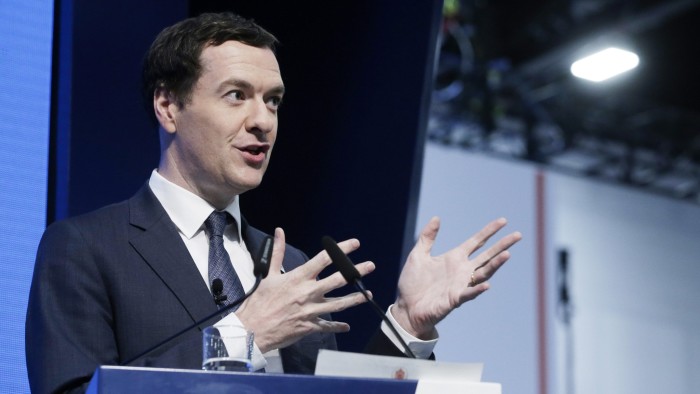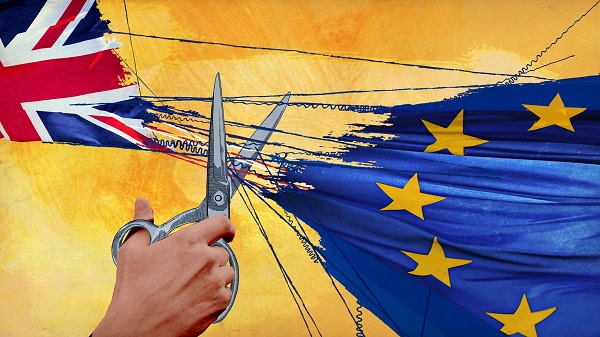Osborne warns Brexit means tax rises and spending cuts

George Osborne has threatened to raise income tax and inheritance tax rates as well as taking the axe to health and schools spending in an emergency Budget shortly after a vote to leave the EU.
The chancellor’s warnings of a £30bn black hole in the public finances that would need to be tackled stem from the economic pain of a so-called Brexit, which would hit tax revenues, leaving public borrowing higher than it would be.
The threats, made with his predecessor Alistair Darling, are an attempt by the Remain campaign to focus minds back on the economy at a time of severe market turbulence as opinion polls swing towards leaving the EU.
Mr Osborne told the BBC Today programme, that to plug the £30bn hole — an average of the range of long term fiscal pain estimated by the Institute for Fiscal Studies — he would need to raise the basic rate of income tax by 2p in the pound, higher rates by 3p and add 5p in the pound to the 40 per cent inheritance tax rate.
In addition, alcohol and fuel duties would need to rise by 5 per cent, the Remain campaign said, to plug £15bn of the fiscal hole with the total tax rises.
On the public spending side, the chancellor said the NHS, education and defence spending would need to be cut 2 per cent, but there would also have to be reductions to pensions, the home office, policing and transport.
“As chancellor, I would have a responsibility to try to restore stability to the public finances and that would mean an emergency Budget where we would have to increase taxes and cut spending,” Mr Osborne said.
“Far from freeing up money to spend on public services as the Leave campaign would like you to believe, quitting the EU would mean less money. Billions less. It’s a lose-lose situation for British families and we shouldn’t risk it.”
Mr Osborne said he was “spelling out what [leaving] means for people’s lives — it would be self-imposed austerity”.
He said that the effects were already being felt because lots of businesses were already delaying decisions about the future. Accused of scaremongering, the chancellor doubled down on his warnings, saying that after a vote to leave the EU, “we would wake up with no economic plan, with financial instability and with years of uncertainty”.
————————-
UK’s EU referendum: full coverage and analysis

View the FT’s comprehensive guide to the vote on whether Britain should stay in Europe, with all the latest news, analysis and commentary from both sides of the debate. See more
————————-
Mr Darling added: “The Leave campaign has no idea, no plan whatsoever. Any political party seeking election on such a flimsy and fraudulent prospectus would have been torn to pieces by now.”
Few expect Mr Osborne would survive as chancellor if the country votes to leave, since he would be running an economic strategy he has said is “economically illiterate”. And indications the Conservative party forces were already rising against him mounted on Wednesday when 57 Tory MPs described Mr Osborne’s emergency Budget as absurd and pledged to vote against it. In a statement, they warned: “If he were to proceed with these proposals, the chancellor’s position would become untenable.”
MPs campaigning to leave the EU said they would vote against any proposed tax rises. Steve Baker MP said: “I am shocked that the chancellor is threatening to break so many key manifesto pledges on which all Conservative MPs were elected. I could not support these plans to cut the NHS and increase taxes on hardworking families.”
Chris Grayling told Sky News earlier: “I think we need to take this morning’s announcement with a heavy pinch salt. I don’t think it’s coincidence this is happening when the Remain campaign is struggling in the opinion polls.”
He said predictions the pound would fall and consumers would stop spending were not credible.
“This is not what is happening in the real world. We’ve just seen a set of manufacturing figures that shows our economy is doing well and we’re seen the value of the pound stay higher than it was two months ago. I simply don’t accept what we’re being told today.
“We are the EU’s biggest customer. Farmers all across France, and there are German car workers who depend on British consumers for their jobs. The idea they are going to go to war against their biggest customer is simply not right.”
The Leave campaign insists it will have more money to spend after Brexit when Britain no longer has to pay its net contribution to the EU. “The In campaign are panicking — but no one will believe these hysterical prophecies of doom any more. If you want a brighter future the only option is to Vote Leave on 23 June,” Mr Baker said.
The vast majority of experts agree with the chancellor that the long term outcome of leaving the EU is likely to harm rather than help the public finances. Few economists would expect an immediate emergency Budget as the public finance implications of Brexit would take time to become known.
Responding to the pledge to hold an emergency Budget, Jonathan Portes of the National Institute of Economic and Social Research said while it was “entirely legitimate” of the chancellor to warn of tax rises and spending cuts in the long term as a result of Brexit, an emergency Budget to tighten policy would be “entirely the wrong response to a Brexit shock”. He said it would take years to know how much adjustment was needed because in the weeks after Brexit we would have “no idea how much poorer we’re going to be in the medium run”.
Mr Osborne’s former chief of staff, Rupert Harrison, said that whatever you think about whether an immediate Budget was required, action to raise taxes and spending in the medium term would be needed quickly to show the government had a grip on the public finances. He pointed out that even though Labour had cut taxes in response to the global financial crisis in 2008, “pre-announced tax rises and spending cuts were part of the emergency response”.
Letter in response to this article:
Osborne has crossed a line with tax threat / From Gordon Bonnyman
Comments